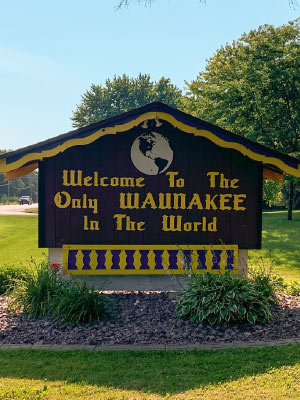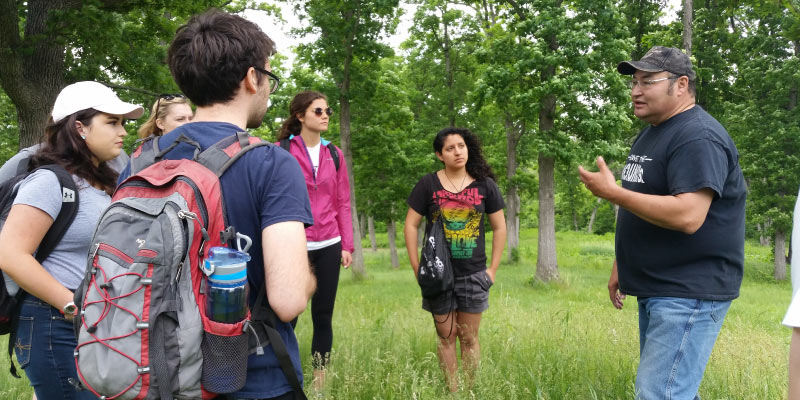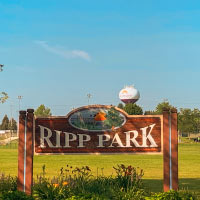
Located just north of Madison, Wis. within the Ho-Chunk ancestral territory of Dejope, the Village of Waunakee is unique in many ways, but perhaps most notably it is the only Waunakee in the world. A new partnership between the University of Wisconsin-Madison UniverCity Year (UCY) program, the Ho-Chunk Nation, and the Village of Waunakee is focusing on the village’s unique history and helping to create a “tangible shift” in the way the community recognizes and celebrates its past.
The partnership was forged thanks to the UniverCity Year program, which brings faculty, students, and members of Wisconsin communities together to address local challenges through engagement, university research, and state-of-the-art problem-solving approaches. In this case, UniverCity Year partnered with the Village of Waunakee to work on a variety of projects related to diversity, equity, inclusion, and civility; several of which focus on the relationship with the Ho-Chunk Nation.
“We’ve been talking for years about doing this and I just thought it was important for us to recognize those who had been here before us and for our community to understand the heritage here and what the Ho-Chunk Nation means to this area,” said Chris Zellner, the Waunakee Village President. “We are at a starting point where there’s so much more we can learn and do with each other.”

For several of the projects, particularly those that will work to recognize the Indigenous history of the area, UniverCity Year has partnered Waunakee leaders with Nelson Institute faculty associate, Jessie Conaway and students in her spring 2021 Environmental Studies 600: Senior Capstone. Since 2016, Conaway has been collaborating with First Nations in Wisconsin through a variety of programs including Native Nations_UW and Earth Partnership. She also previously worked with UniverCity Year and the Ho-Chunk Nation on a project in Monona. Together, Conaway, her students, Ho-Chunk Nation and Waunakee leaders, and UniverCity Year staff have been working together to develop educational programming, land acknowledgement, community installations, and more.
“One of the greatest things about the Nation is that we want to create a symbiotic relationship with our neighbors and our greater community.”
—Ryan Greendeer,
Public Relations Officer, Ho-Chunk Nation
“This is a Tribal, municipal partnership that’s starting and we are the third leg of the stool,” Conaway said of the university’s role in these efforts. “We focused on the building blocks of how we would build relationships and how we would promote cultural education within the Waunakee community and schools. What we did together with the students created a tangible shift.”
Conaway and her class worked on five projects with Waunakee including:
- Offering educational and training opportunities on Ho-Chunk Culture for the Waunakee community
- Developing educational programming in Waunakee Schools about Ho-Chunk culture
- Drafting a land acknowledgment statement for Waunakee
- Developing parks and greenspace management protocols and a cultural resources management plan for Waunakee
- Designing community-based installations of Ho-Chunk culture in Waunakee
While developing each project, the students worked closely with the Ho-Chunk Nation to ensure that the land acknowledgement statement, educational programming, and installations were accurate and respectful of Ho-Chunk culture.
“The Ho-Chunk Nation has been a joy to work with throughout the project. Waunakee knew it had a lot to learn about its past, and the Nation was very willing to come to the table to help them grapple with it and find ways to educate the public,” said UniverCity Year and UniverCity Alliance managing director, Gavin Luter. “It was very important early in the project to ensure that the leadership of Waunakee and the Nation were willing to commit the time necessary to do meaningful work. After that happened, it was a productive relationship that continues to spur new connections.”

For the students, these connections were an opportunity to learn Ho-Chunk history, community collaboration, environmental priorities, and more.
“I enrolled in Dr. Conaway’s course hoping to gain community collaboration experience with the Ho-Chunk Nation,” said Megan Binkley, who was enrolled in the Capstone course and will soon go on to an Archaeology PhD program at the University of Wisconsin-Madison in the fall. “Throughout the semester, I was simultaneously and consistently struck by Dr. Conaway’s dedication to her students and her work, and the generosity of our community partners from the Ho-Chunk Nation. Dr. Conaway went above and beyond to support her students by providing them with access to her expertise, years of experience-based learning, and extensive network of community contacts. Our community partners from the Ho-Chunk Nation were also extremely generous with their time, and with their willingness to share their expertise, knowledge, stories, and histories with the capstone students. Overall, these factors created a once-in-a-lifetime learning environment.”
Ryan Greendeer, public relations officer for the Ho-Chunk Nation, shared that they are honored to be a part of these learning opportunities.
“The Ho-Chunk people are the original inhabitants of the area and, of course, celebrating the history of Waunakee we wanted to be involved in that,” said Ryan Greendeer, the public relations officer for the Ho-Chunk Nation. “One of the greatest things about the Nation is that we want to create a symbiotic relationship with our neighbors and our greater community.”
Greendeer shared that he and the Ho-Chunk Nation were proud to share more about their culture and traditions through a series of cultural trainings with Waunakee leadership. He was also particularly excited to be a part of the signage installation project as it allowed for great collaboration between the Ho-Chunk Nation, Waunakee, and the UW-Madison students.
“If we take a look at signage project for example, as Ho-Chunk was never a written language, but we are getting to a point where if we aren’t able to talk with people and share how we came to be in the area, then we can’t convey that to a larger audience,” Greendeer said. “It’s a medium that we aren’t used to historically, but it’s something that can be used to educate. Helping out with these different training events and talking to people helps us to get our story out. And the more we do it, the more we see people who have a knowledge base of the Nation. That for me is inspiring as it shows that what we are doing in the community is working. People are becoming educated and I think that’s extremely important, especially as it is helping to build the relationships that we’ve always wanted.”
In May, the students presented their projects to the Village of Waunakee and representatives from the Ho-Chunk Nation. Now, UniverCity Year staff will be working with Waunakee leaders and the Ho-Chunk Nation to implement the projects.
“What’s really impressive about the UCY partnership is the way in which the UCY staff work with their clients, in this case Waunakee, to scope the work. I think that was extremely productive and resulted in something better than we expected,” said Todd Schmidt, the Village administrator. “The connections of UCY and the Nelson Institute were a critical ingredient in helping to receive support from the Ho-Chunk Nation. We had the right people from the Nation at the table and I thank UCY and the Nelson Institute for helping to make that happen.”
Schmidt and Zellner are also thankful for the support and assistance provided by the Ho-Chunk Nation. Throughout the project, and particularly the community trainings, Schmidt and Zellner said the community has learned some important lessons and built significant relationships.
“The Ho-Chunk have been very gracious in affording us this opportunity to learn. What I noticed was that as the Ho-Chunk Nation leaders at the very top level leaned into Waunakee, Waunakee leaned right back into them. I felt there was this eagerness from both sides of the table and that helped to produce some products, or hopeful products, that will be very meaningful,” Schmidt said. “I’ve learned that we are walking today on the same soil that a Ho-Chunk village sat on. We’re looking at the product of what the Ho-Chunk Nation cultivated as a land. In learning about that and the culture during the training they provided us, I’ve come to appreciate that in a way I didn’t before. It’s created a sense of responsibility for me, but my sense is that others have also come to gain that sense of responsibility as well.”
“What I noticed was that as the Ho-Chunk Nation leaders at the very top level leaned into Waunakee, Waunakee leaned right back into them. I felt there was this eagerness from both sides…”
–Todd Schmidt,
Village Administrator,
Village of Waunakee
Likewise, UCY staff are honored to have played a part in supporting this relationship building and these learning opportunities.
“I’ve been so inspired by how gracious the Ho-Chunk Nation has been with their time and the openness Waunakee has to learn about what, at times, can be an uncomfortable history,” Luter said. “We hope to inspire others to do similar work to connect local governments with tribal nations. Finally, this would never have worked if Jessie Conaway would not have agreed to take this on as a class project. We hope Jessie’s experience inspires others to do these kinds of community-based learning experiences. It helps us achieve the most authentic version of the Wisconsin Idea.”